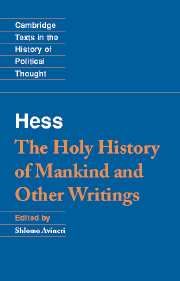Book contents
- Frontmatter
- Contents
- Introduction
- Chronology of the life of Moses Hess
- A note on the text
- Bibliographical note
- The Holy History of Mankind
- Dedication
- PART ONE THE PAST AS THE FOUNDATION OF WHAT WOULD HAPPEN
- PART TWO THE FUTURE, AS THE CONSEQUENCE OF WHAT HAS HAPPENED
- First Chapter The Natural Striving of Our Age or the Foundation of the Holy Kingdom
- Second Chapter Our Present Plight as the Mediator of the Foundation of the Kingdom
- Third Chapter The New Jerusalem and the End of Days
- SOCIALISM AND COMMUNISM
- A COMMUNIST CREDO: QUESTIONS AND ANSWERS
- CONSEQUENCES OF A REVOLUTION OF THE PROLETARIAT
- Appendix: Christ and Spinoza (from Rome and Jerusalem)
- Index
- CAMBRIDGE TEXTS IN THE HISTORY OF POLITICAL THOUGHT
A COMMUNIST CREDO: QUESTIONS AND ANSWERS
Published online by Cambridge University Press: 05 June 2012
- Frontmatter
- Contents
- Introduction
- Chronology of the life of Moses Hess
- A note on the text
- Bibliographical note
- The Holy History of Mankind
- Dedication
- PART ONE THE PAST AS THE FOUNDATION OF WHAT WOULD HAPPEN
- PART TWO THE FUTURE, AS THE CONSEQUENCE OF WHAT HAS HAPPENED
- First Chapter The Natural Striving of Our Age or the Foundation of the Holy Kingdom
- Second Chapter Our Present Plight as the Mediator of the Foundation of the Kingdom
- Third Chapter The New Jerusalem and the End of Days
- SOCIALISM AND COMMUNISM
- A COMMUNIST CREDO: QUESTIONS AND ANSWERS
- CONSEQUENCES OF A REVOLUTION OF THE PROLETARIAT
- Appendix: Christ and Spinoza (from Rome and Jerusalem)
- Index
- CAMBRIDGE TEXTS IN THE HISTORY OF POLITICAL THOUGHT
Summary
[First published as an anonymous brochure in 1844, later reprinted in Rheinische Jahrbücher zur Gesellschaftlichen Reform (Rhenish Yearbooks for Social Reform), Darmstadt: Constanz, 1846.]
Of Labour and Enjoyment
1. What is the meaning of working?
Every transformation of matter for the life of mankind means working – or acting, creating, generating, manufacturing, producing, taking action and dealing, being active, in short: living. Because truly, all that lives, works; and regarding human life, not only through the head and hands, but also through all other limbs and organs of the human body which transform for human life the materials which they receive from outside, e.g. the mouth processes the received materials for the stomach, and the latter does the same for the blood and so on. This means that each organ of the human body, like each member of society, produces for the whole or works and creates even while it appears to be merely consuming and enjoying; at the same time it only enjoys its own life when it appears to work or produce for the whole. This harmony of work and pleasure takes place only in organic or organized life, not in the un-organized one, as we shall presently show.
2. What kinds of work exist?
Organized and unorganized. In other words: free and coerced or forced labour.
- Type
- Chapter
- Information
- Moses Hess: The Holy History of Mankind and Other Writings , pp. 116 - 127Publisher: Cambridge University PressPrint publication year: 2004
- 1
- Cited by



